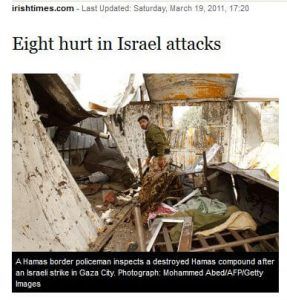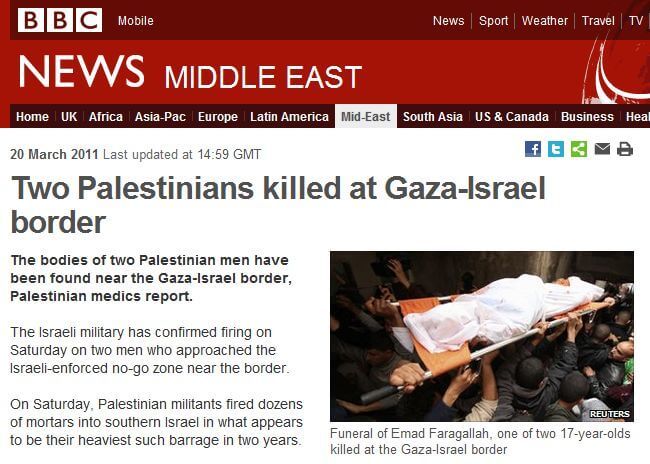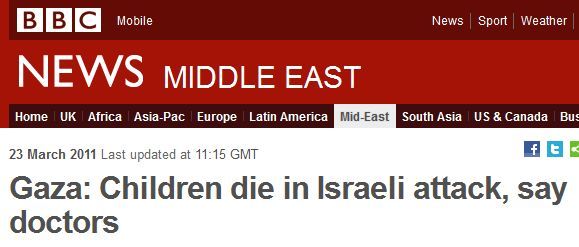With the international media’s attention fixed on Libya and Japan, Israel has found itself out of the usual media glare up until Wednesday’s bombing in Jerusalem. This would ordinarily be a good thing. Instead, however, with less column inches available for other world news, editors have indulged in selective reporting or under reporting of important stories from Israel.
You may not have seen the following stories from the past two weeks. Or if you did, perhaps you didn’t get the full picture.
Gaza Mortar Barrage
While the media reported an initial 124 missiles launched at Libyan targets, Israel’s south came under a barrage of some 50 mortar shells fired from Gaza, which injured two, on Saturday morning. The media has come to treat the firing of missiles from Gaza as “normal” and therefore not newsworthy. Nonetheless, this escalation barely registered with the foreign press…. until the Israeli reaction.
A good case study in bias is this Reuters report that appeared in the Irish Times.

- Chronological inversion: The story focuses on the Israeli response to the mortar barrage rather than the initial mortar barrage itself.
- Moral equivalence: The headline refers to “Israel attacks” despite the fact that Israel’s actions were made in self-defense as a response to an attack on its civilian population. In addition, lumping “Eight hurt” together fails to distinguish between Hamas “security officers” and Israeli civilians who were indiscriminately yet deliberately targeted.
- Photo bias: Instead of publishing a photo of mortar damage on the Israeli side or even Palestinian terrorists with their armaments, the photo choice of a bombed out Palestinian building in Gaza is meant to portray Palestinians as the aggrieved victims.
BBC Bias Continues
Of course, any case study of bias wouldn’t be complete without a contribution from the BBC. The Palestinian mortar barrage barely registered on the BBC’s radar. Instead, the story was subsumed by one on March 20 headlined “Two Palestinians killed at Gaza-Israel border” where the mortar attack was certainly not the focus of the story.

The BBC, in typical fashion, concluded its article with the following:
Israel often opens fire on people who it says go too close to the fence to stop attacks by militants.
Dozens of people have been killed in this way, many civilians.
The UK’s Sunday Times recently focused on the Gaza buffer zone, an issue that HonestReporting took up, speaking with a high-ranking IDF officer to find out the facts that weren’t being reported. Unfortunately, the BBC also failed to explain the rationale and the very real security concerns behind the buffer zone.
The next day, on March 21, the BBC led with “Gaza Strip: Israel launches air strikes” and on March 23 with “Gaza: Children die in Israeli attack, say doctors“. Compare the opening paragraphs of these three BBC reports:
- March 20: The bodies of two Palestinian men have been found near the Gaza-Israel border, Palestinian medics report.
- March 21: At least 17 people have been injured by a series of Israeli air strikes in the Gaza Strip, Palestinian medics say.
- March 23: Two Israeli military strikes on Gaza have killed eight Palestinians, medical officials say.
Clearly the BBC likes to rely on “Palestinian medics” despite the numerous occasions where they have been found to be at best, unreliable, and at worst, outright liars. But the BBC continues to place its faith in the Palestinian narrative.
Also note from the headline below how the BBC treats Palestinian sources compared to Israeli ones. We previously addressed how the BBC employs the use of parentheses and quotation marks in its headlines to cast doubt on the veracity of Israeli accounts or stories that cast the Palestinians in a negative light e.g. “Palestinian ‘kills five Israelis’ in West Bank”.
Now look at the headline below. Note how, despite being attributed directly to Palestinian doctors, no quotation marks appear in the headline. The claim is taken as pure fact.

Despite the fact that IDF air strikes were in response to Saturday’s mortar barrage as well as a Grad missile attack on Ashkelon on Sunday (which also received scant press coverage), the BBC paid lip service to the Palestinian mortar attack in one line of the article.
Again, the BBC rounded off its March 21 article with a sweeping statement referring to Israel’s Operation Cast Lead yet lacking in any context:
More than 1,300 Palestinians as well as 13 Israelis were killed.
No mention of disputed casualty figures or how many of those Palestinians were active combatants. In the BBC’s world, all Palestinians are victims of Israeli policy irrespective of whether they are armed terrorists or not.
So it appears that the BBC remains unaffected by the high volume of other foreign news from around the globe, continuing its well-documented bias. Unfortunately, as less well-resourced news outlets struggle to cover everything, the contagion has spread.
A Small Glimmer of Hope – UK Politician Slams BBC Over Silence on Itamar Murders

Hats off to British MP Louise Bagshawe for taking the BBC to task for its coverage or rather, lack of coverage of the brutal murders of the Fogel family in Itamar. Writing in the Daily Telegraph, she describes finding out about the attack via Twitter:
Horrified, I went to the BBC website to find out more. There I discovered only two stories: one a cursory description of the incident in Itamar, a West Bank settlement, and another focusing on Israel’s decision to build more settlements, which mentioned the killings in passing.
As the mother of three children, one the same age as little Elad, who had lain bleeding to death, I was stunned at the BBC’s seeming lack of care. All the most heart-wrenching details were omitted. The second story, suggesting that the construction announcement was an act of antagonism following the massacre, also omitted key facts and failed to mention the subsequent celebrations in Gaza, and the statement by a Hamas spokesman that “five dead Israelis is not enough to punish anybody”.
There were more details elsewhere on the net: the pain and hurt, for example, of the British Jewish community at the BBC’s apparent indifference to the fate of the Fogels. The more I read, the more the BBC’s broadcast silence amazed me. What if a settler had entered a Palestinian home and sawn off a baby’s head? Might we have heard about it then? On Twitter, I attacked the UK media in general, and the BBC in particular. I considered filing a complaint.
Read the full piece here.
The Victoria Weapons Ship
If a media outlet constantly publishes stories about Gaza’s “suffering” under an Israeli blockade or the “brutality” of Israel’s boarding of the Mavi Marmara flotilla, then surely the readership also deserves to see exactly why Israel is enforcing a naval blockade of Gaza?
On March 15, the Israeli Navy seized an Iranian arms shipment bound for Gazan terror groups. Despite the evidence of some 50 tonnes of weapons presented to the media at Ashdod Port and a wealth of IDF-released video footage of the boarding and subsequent discovery of the hidden arms on board the Victoria, the incident garnered very little coverage.
In addition, the behavior of Iran and Syria, offering material support to terrorist groups deserves to be exposed as widely as possible. The Turkish seizure of weapons on board an Iranian aircraft also failed to register with the media.
When it comes to the Middle East and Israel, very often it is not necessarily what is written that skews the reality but what is missed out.
Keep up to date on the news that you aren’t getting from the mainstream media by checking reputable Israeli news sources such as the Jerusalem Post and YNet News as well as, of course, HonestReporting and our daily Backspin blog.


